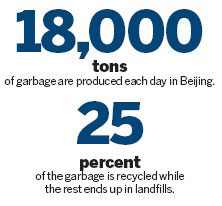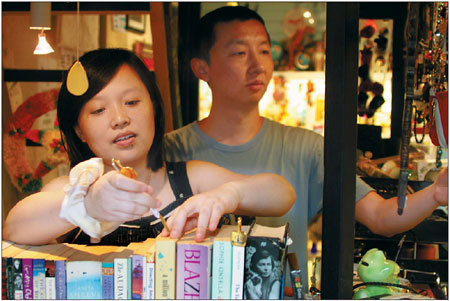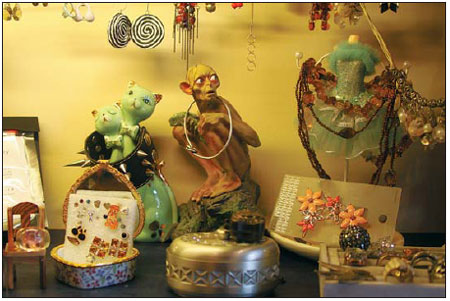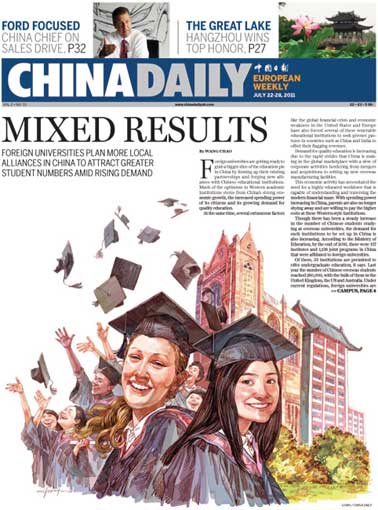Society
Giving life a second chance
Updated: 2011-07-19 07:55
By Tiffany Tan (China Daily)
|
Zhong Jie and Liao Hongbin at their popular swap shop, Change, in Beijing. Photos by Zhu Xingxin / China Daily |
|
The jewelry section of the Change shop. All items in the shop are secondhand. |

More people looking to optimize the use of unwanted household items are turning to an online network of 8.5 million members in more than 100 countries. Tiffany Tan reports.
How would you get rid of unwanted things that still have many years of use left in them? A) Give them to a friend; b) Sell them online; or c) Leave them for the garbage collector? Hayley Robinson and her husband, Beijing residents from Britain, who used their clothes washer/dryer to wash their newborn son's cloth diapers before switching to disposable ones, decided to offer it to strangers on Freecycle Beijing, an online community that advocates giving away things one no longer wants.
"We have picked up items from Freecycle, so we thought it was a good way for us to give back to the community," Robinson, 30, says in an e-mail from England, where she's vacationing with her 8-month-old baby.
Freecycle Beijing, which has been active since late 2006, has 1,000 registered members. A survey of its Yahoo! group page shows people offering things as varied as knitting magazines, a treadmill, a breastfeeding pillow, an iPhone and a pet rabbit "who likes to be petted on the head (a lot)".
Since Freecycle's is a two-way flow of products, the website is dotted with "wanted" posts, many of them for used cell phones and laptop computers. Some members, on the other hand, solicit items to be given to Chinese charity organizations.
"Last year, we received an enormous number of donations for orphanages, so much so that they had to ask me to stop bringing things because they didn't have enough space," says Malaz Asashhatap, from the United States, who has collected clothes, books, bags, toys and shoes from fellow members of Freecycle Beijing.
The Freecycle Network is a US import. It began in Tuczon, Arizona, in May 2003, organized by a 35-year-old who wanted to give away his bed, only to find out that local thrift shops did not accept beds fearing they might be playing host to fleas.
"I was a bit flummoxed but then tried my friends to see if someone could use it because it was a very nice bed," Deron Beal, founder of the nonprofit group, says in an e-mail. "It wasn't until I realized I had no choice remaining but to borrow a truck and haul it to the landfill that I really realized something was amiss in the world."
So, Beal started a network of 30 to 40 friends online and offered the bed.
Now that network claims 8.5 million members in 100 countries, who operate close to 5,000 online communities, including those in Chinese cities such as Beijing and Hong Kong.
Freecycle says its members are "keeping over 900 tons out of landfills daily" and that items they gave away in 2010 were "the equivalent of over 13 times the height of Mount Everest (also known as Mount Qomolangma) when stacked in garbage trucks".
Reusing appears to be one of the neglected Rs of the three Rs of recycling, which are reduce, reuse and recycle. Ninety-eight percent of all waste comes from the manufacturing process, Beal says, which means "if we all, as consumers, recycled 100 percent and had no waste, that 98 percent of the waste would still be out there".
"So, if you give away an old sofa, you are not just keeping 100 lbs (45.4 kg) out of the landfill, you are also keeping a ton of raw materials from being extracted from nature to make a new sofa," he says. "If we begin to think like this as consumers, then producers will gradually also begin to reuse materials and we'll effect change in a positive way for all."
Beijing, with its population of 20 million, generates 18,000 tons of trash each day, according to the Darwin Institute for Environmental Studies, a non-government agency that monitors recycling in the Chinese capital. Of that, a quarter is recycled while the rest ends up in landfills.
Two other people helping keep stuff away from Beijing's landfills are Liao Hongbin and Zhong Jie, a husband and wife who own Change, a shop on Wudaoying Hutong, where people can trade in things they no longer want.
The 20-square-meter shop, every surface crowded with items big and small, is how you' would envision Santa Claus' workshop to be if he dealt only in secondhand goods.
"How about the black attache case for father and the scarf in geometric print for mother?" You can almost imagine Father Christmas thinking. "The translucent iPod shuffle case would be ideal for big brother, while little sister would love the silver dangling earrings. And oh, the electric juicer is just what grandpa and grandma need."
There are also objects whose future seems more uncertain; for instance, a silver receptacle that's reminiscent of Aladdin's magic lamp, a curly-hair dryer from the 90s and a canteen shaped like an anchor with what looks like Genghis Khan on its leather cover.
But 35-year-old Liao, a native of Jilin province and an IT engineer by training, reminds people not to judge too quickly. "One man's trash is another man's treasure," he says, repeating an adage.
Thirteen months ago, few would have guessed a swap shop could make as much money as a reggae bar in the central business district, the couple's former business venture, whose building was demolished last year.
"We make money from customers who pay cash," Liao says of the swap shop, adding that a big attraction is that "you never know what you're going to find".
Change shop will take almost anything smaller than a microwave, except for clothes, shoes, cosmetics, cups and glasses, old electronic products, food and drinks and luxury-brand goods, whose value is quite tricky to determine. Customers who take items of less value than they bring are given credit toward their next visit, but anybody can come in and shop with cash, just like any other store.
The couple opened the shop not because of some heightened awareness of environmentalism, but because they needed to get rid of things from their old bar. Now, they themselves are using more and more second-hand goods, and Liao is one entrepreneur who prays for imitations.
"Many people who come up with creative business ideas are afraid of being copied," he says. "But we say, 'We welcome copies'. Every compound, every neighborhood should have a swap shop."
And as if to prove his prescience, one recent bright Thursday afternoon, four college students from Tianjin trooped into the shop to ask Liao for tips on opening their own swap shop.
(China Daily 07/19/2011 page18)
E-paper

Ringing success
Domestic firms make hay as shopping spree by middle class consumers keeps cash registers ringing in Nanjing
Mixed Results
Crowning achievement
Living happily ever after
Specials

Ciao, Yao
Yao Ming announced his retirement from basketball, staging an emotional end to a glorious career.

Going the distance
British fitness coach comes to terms with tragedy through life changes

Turning up the heat
Traditional Chinese medicine using moxa, or mugwort herb, is once again becoming fashionable


